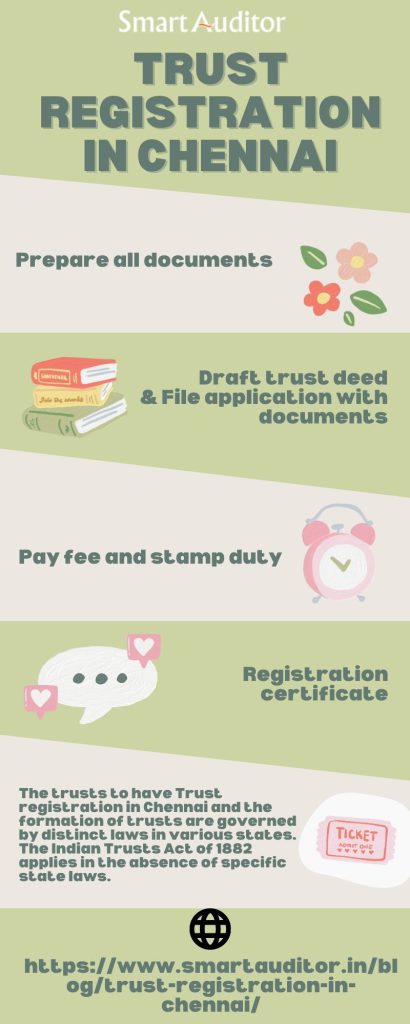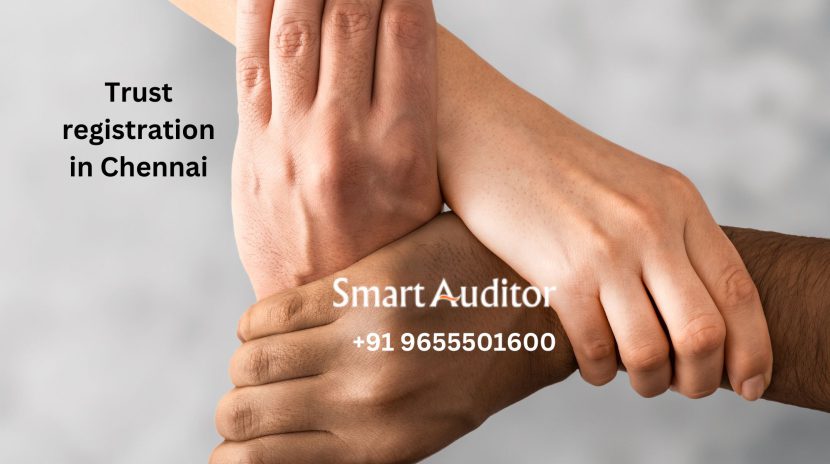The Indian Trust Act governs and registers the trust. Simply put, it is a financial instrument used to transfer legal property from an owner to a trust. The term “trust” typically refers to religious beliefs; however, this restriction does not exist. Even sports academies that are registered as trusts exist.
Some societies in India are registered as public trusts. You may even hear of wealthy individuals establishing private trusts; this is done because the trust is tax-efficient (the minimum alternative tax and dividend distribution tax are not applicable). Compared to making a will, it is the simplest transfer method. However, registering a trust requires significantly more effort than writing a will.
The trust deed and major elements
An essential component of Trust registration in Chennai is a Trust Deed. Although it is not required, it is desirable due to its legal enforceability.
When there is property involved, a Trust Deed is a must to provide evidence of the trust’s existence.
- The name and address of the Trust’s Settler or Author.
- The other trustees’ names and addresses.
- The trust’s title.
- Trustees’ minimum and maximum numbers. The maximum number is unlimited, while the minimum number is two. However, you must establish your Trust’s maximum number. The trust is run by the Board of Trustees, which is made up of all of the trustees.
- The address of the trust’s registered office is necessary for Trust registration in Chennai.
- Motives behind the Trust’s formation.
- Goals for the trust.
- The trust’s rules and regulations are important for Trust registration in Chennai.
- Details regarding the intended bank account: which branch and bank you will use to open an account?
- The deed for Trust registration in Chennai must specify the Trustees’ tenure. In the process of selecting trustees, the electoral process is not required.
- Chairperson and Managing Trustee are two examples of trustee titles that can be assigned by the Board of Trustees.
- The Trust Deed should list these positions and their responsibilities for Trust registration in Chennai.
- Trustees are eligible to be compensated for the professional services they provide to the Trust, even though they are unable to access any funds from the trust fund. This should be found in the Trust Deed.
- The date the Trust Deed was signed is necessary for Trust registration in Chennai.
- Information about the movable and immovable assets in the Trust Fund established by the Settler.
- Also includes information about the activities and sources of income that will be put into the Trust fund.
- A strategy for how the money will be divided up among beneficiaries or used to carry out programs and projects that will benefit them.
For Trust registration in Chennai, a new trust deed must be prepared and filed with the Registrar’s Office as soon as possible in the event of any changes to the original, which include opportunities for the registered office, trustees, and objects.
In India, trust registration under the Income Tax Act (sections 80G and 12A)
80G Income Tax Registration for a Charitable Trust
If a person or organization donates to a Charitable Trust that has Trust registration in Chennai under section 80G, they can deduct 50% of the donation from their taxable income.
For instance, if a person gives an amount. The individual can then obtain Rs. 5,000 as a tax deduction from their income. Which encourages individuals to contribute more to an 80G-registered organization.

80G is a one-time registration that lasts for a lifetime.
How to register for 80G:
The Income Tax Commissioner, who has jurisdiction over such an organization, must receive an application on form 10G and the necessary documents.
Before granting, the Income Tax Officer conducts an inspection and checks.
12A Income Tax Registration for a Charitable Trust
The most significant sections of the Income Tax Act of 1961 for Religious and Charitable trusts are Sections 11 and 12. This section covers the taxation of trusts created with the goals of helping the poor, working for the environment, serving the public good, serving a religious purpose, etc.
The section specifies which portions of the income of the trust that has Trust registration in Chennai are taxable and which are not. Capital gain from the Trust’s assets, its activities, or donations can all contribute to the income.
How a trust can register under these sections is defined in the new Income Tax Act’s Section 12AA.
The Income Tax Commissioner must be notified of an application made using form 10A and any necessary documentation. This is a one-time registration, and an NGO must register under section 12A to receive the tax exemption.
To register under section 12A, an application on form 10A and the necessary documents must be submitted to the Income Tax commissioner, who has jurisdiction over such an organization.
Before granting, the Income Tax Officer conducts an inspection and checks.
Trust registration process
Trust registration in Chennai, can be done by the following process.
Prepare all documents
Prepare all of the required documents by the Trust Act’s guidelines for Trust registration in Chennai, which are provided by the charity commissioner or registrar.
Choose the Trust’s name for Trust registration in Chennai.
Draft trust deed
Establish a Trust Deed for Trust registration in Chennai. Here, professional assistance is needed.
File application with documents
Send the application to the jurisdictional Registrar or Charity Commissioner along with the required documents and Trust Deed.
The filing procedure for Trust registration in Chennai can be completed online in a few states; otherwise, the entire procedure must be completed in person at an authority.
Pay fee and stamp duty
Make the government’s payment fees can be paid online, in cash, or any other way the registering authority allows for Trust registration in Chennai.
On the value of the assets that have been transferred to the Trust, there will be a stamp duty to be paid at the state’s rate.
Registration certificate
The Authority, either the Registrar or the Charity Commissioner, issues a Certificate of Trust registration in Chennai, following approval of the name and Trust Deed. The authority typically takes between 25 and 90 days to complete this process.
Categories of Trust
Any category of Trust can get Trust registration in Chennai.
Four kinds of Trust
- Public Trust
- Private Trust
- Public-Cum Private Trust
- A company formed under Section 8 of the business Act (2013)
Conclusion
When a person, group, or organization wishes to set aside either property or money for a charitable purpose so that the revenue may be used for the accomplishment of the charitable activity and wishes to limit control over the disposition of that income, a trust, also known as a charitable body, is typically established.
The trusts to have Trust registration in Chennai and the formation of trusts are governed by distinct laws in various states. The Indian Trusts Act of 1882 applies in the absence of specific state laws. When there is property involved, especially immovable property like land and buildings, a public charitable trust is typically set up.
It is preferable to establish a public charitable trust to get Trust registration in Chennai if a person wishes to limit control over the disposition of that income to individuals he knows or approves and wishes to set aside either property or money for a charitable purpose so that the revenue may be used for the accomplishment of the charitable activity.
However, it is important to keep in mind that private trusts that have Trust registration in Chennai, do not receive tax benefits because their beneficiaries are typically close friends or relatives and not the general public.

